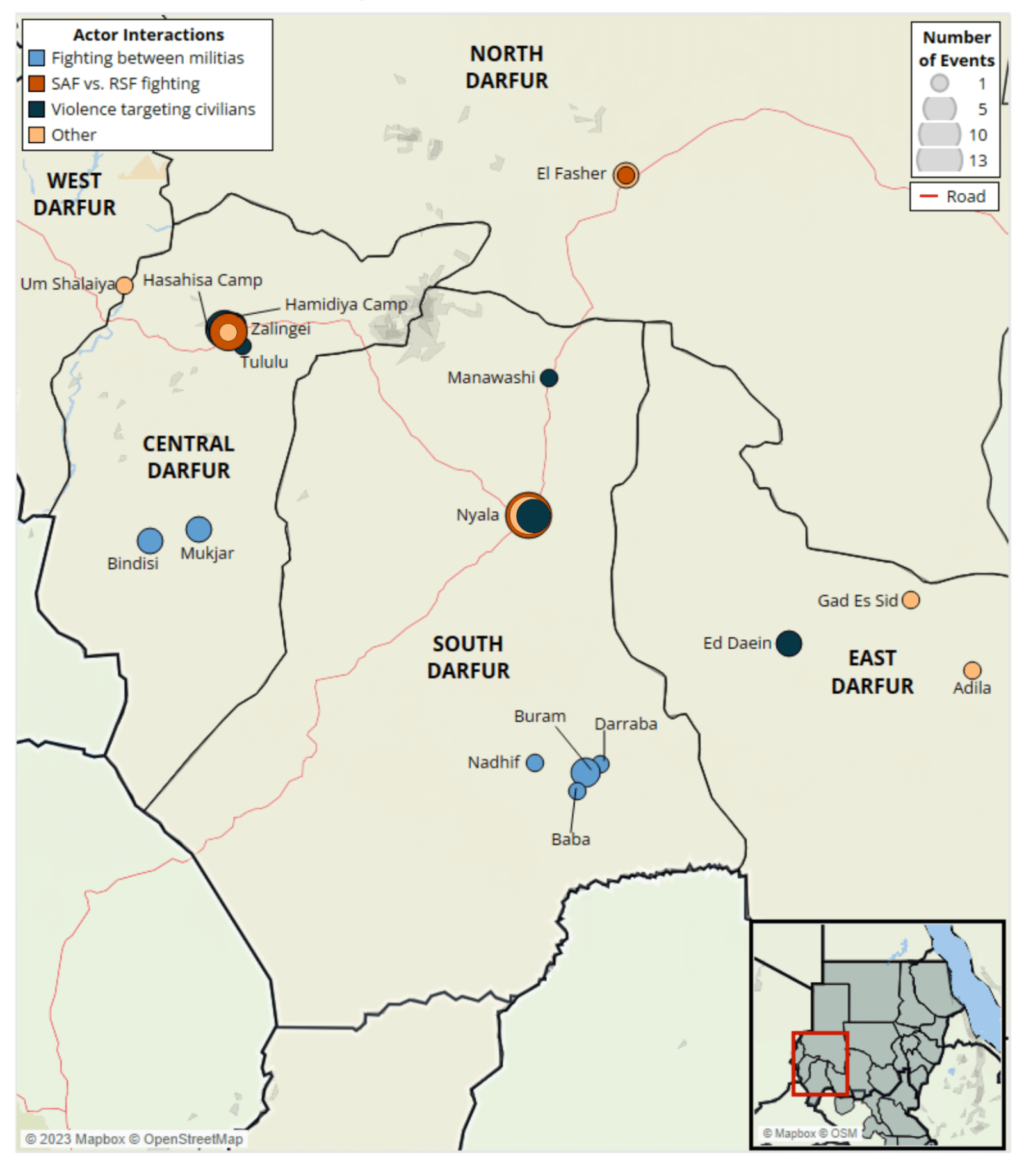RSF secures oilfield in East Darfur

Political violence in Darfur between September 30 and October 27 (Map: ACLED)
The Rapid Support Forces (RSF) launched two attacks on oilfields in East Darfur on Sunday as part of attempts to expand its presence in strategic strongholds in the Sudan’s western region since early October. Parts of East and South Darfur have been cut off from telecommunications for months.
Two RSF units launched an attack on the Zarga Um Hadid oilfield in Adila on Sunday and the Shag Omar field in Abu Karinka that afternoon, an East Darfur journalist told Radio Dabanga yesterday.
“The RSF moved towards the Shag Omar oilfield and secured it on Sunday,” he said. Native administration* leaders intervened to avoid work on the field being affected.
A large RSF force also attacked the Zarga Um Hadid oilfield in Adila from Sunday evening until the early hours of Monday morning. The Sudan Armed Forces (SAF) responded by “sending a huge force” to the area, according to the journalist. It is not clear whether this oilfield was secured by the RSF.
“The attacks came after the Sudan Armed Forces (SAF) withdrew from several garrisons in Darfur,” he explained. The army also withdrew from six garrisons in West Kordofan in recent days to regroup. Military sources reported air strikes on targets in North and West Kordofan on Sunday, but it was not possible to independently confirm the report.
The main oil fields in East Darfur are Zarga Um Hadid, Jad El Seid, and Abu Sufyan. On October 30, members of the RSF reportedly attacked a force securing the petroleum site east of Jed El Sayed in Abu Karinka.
The RSF briefly occupied the Balila oilfield in West Kordofan last week. In East Darfur, they attacked a force securing the petroleum site east of Jad El Seid in Abu Karinka.
RSF control
After the RSF took control of Nyala and Zalingei in end October, and El Geneina on Saturday, they focus on El Fasher and Ed Daein, reportedly to expand their territorial control and thereby enhancing their negotiation leverage in the Jeddah talks.
In early October, the RSF strengthened its presence in Nyala, capital of South Darfur, by rallying fighters from Central, West, and East Darfur to undermine the SAF 16th Infantry Division base in the city.
“South Darfur state is strategically important due to its proximity near Chad, South Sudan, and Central Africa and its location for alleged RSF supply routes,” according to the Armed Conflict Location and Event Data Project (ACLED), a data collection, analysis, and crisis mapping project.
On Thursday, Lt Gen Abdelrahim Dagalo, RSF deputy commander and brother of RSF Commander ‘Hemedti,’ announced “more operations in all Darfur states.”
Telecommunications
The journalist also reported that telecommunications services have been cut off in Yasin and Asalaya for more than a month. A lot of communication infrastructure in Darfur has been damaged due to ongoing clashes.
In an interview with Radio Tamazuj at the end of October, trader El Hadi Abdelrahman said Nyala has been without communication networks, water, and electricity services for six months. “We now rely on the news broadcasts of Radio Tamazuj and Radio Dabanga. We are immensely grateful to these two radio stations for keeping us informed.”
On October 23, Mahmoud Abdelaziz, director of the Nyala University Training and Capacity Building Centre, told Radio Dabanga that a lack of electricity, water, and internet affects the work of health services and pauses financial transfers, along with making information sharing difficult. “We’ve lost contact with our family and loved ones outside the city,” lawyer Ahmed Abakar told Radio Tamazuj.
* The Native Administration was instituted by British colonial authorities seeking a pragmatic system of governance allowing for effective control with limited investment by the rulers. State-appointed native administration leaders executed policies, collected taxes, and mobilised labour on behalf of the central government. According to the Darfur Bar Association, the Native Administration during the rule of dictator Omar Al Bashir (1989-2019) did not represent the real community leaders.











 and then
and then